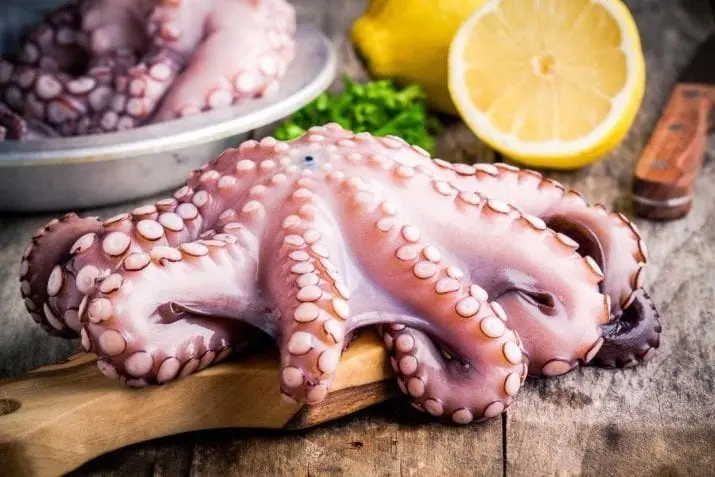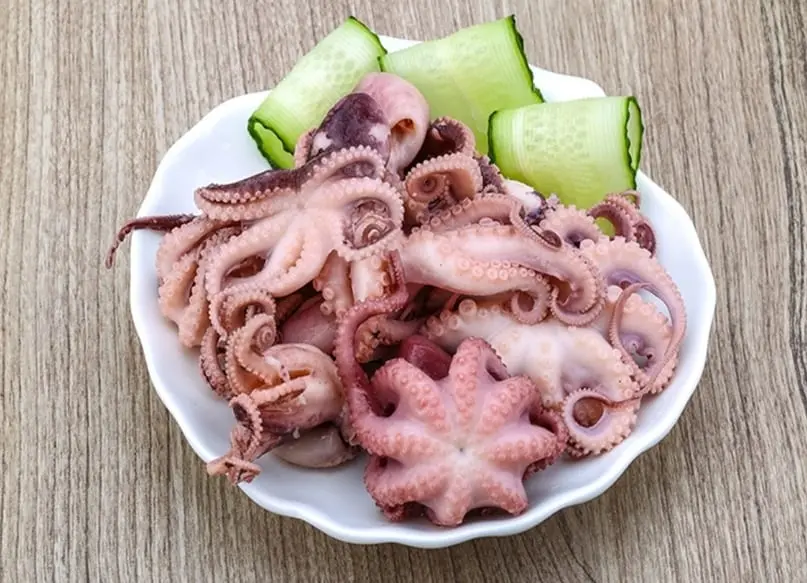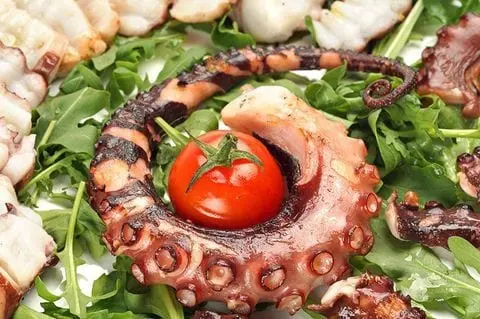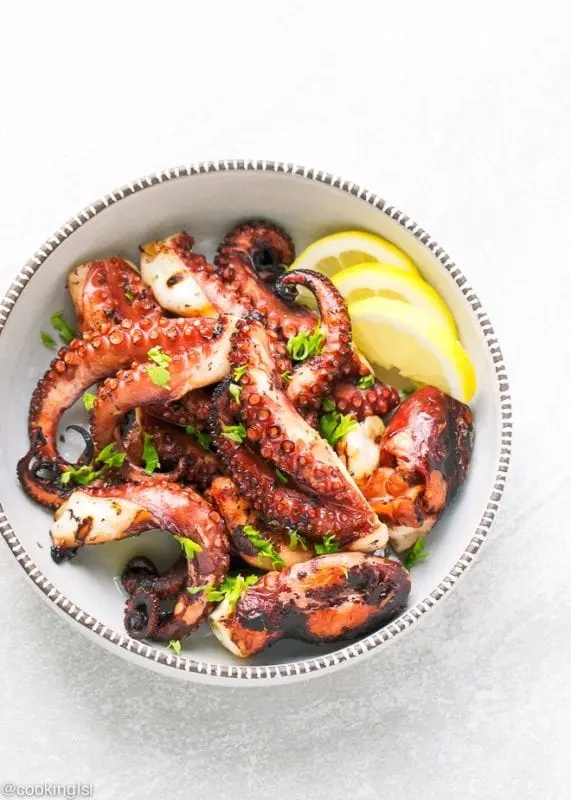Contents
Description
An octopus is a creature whose body is like a ball with eight tentacles that extend from it. In fact, under his baggy body is a highly developed brain and nervous system of a remarkably intelligent animal.
The octopus belongs to the genus of cephalopods. Its body is soft and short, the back is oval in shape. The octopus’s mouth is located at the junction of its tentacles and is similar to the beak of a parrot, while it consists of two powerful jaws.
The octopus’s anal opening is hidden under a mantle, which can be compared to a wrinkled leather pouch. The octopus grinds food with a grater located in its throat. Long tentacles, of which there are 8, extend from the octopus’s head.
In male octopuses, one of the tentacles is transformed into a genital organ. All tentacles are interconnected by a thin membrane. On each tentacle there are suckers, of which there are up to 2000 in total.

Basic characteristics
Type – Molluscs
Class – Cephalopods
Genus / Species – Octopus vulgaris
Basic data:
- SIZE
Length: up to 3 m, usually less.
Weight: about 25 kg. Females reach sexual maturity with a weight of 1 kg, and males – 100 g. - REPRODUCTION
Puberty: females from 18-24 months, males earlier.
Number of eggs: up to 150,000.
Incubation: 4-6 weeks. - LIFESTYLE
Habits: loners; are nocturnal.
Food: Mainly crabs, crayfish and bivalve molluscs.
Lifespan: females die at the age of 2 years after the birth of offspring. Males live longer. - RELATED SPECIES
The closest relatives are nautilus and decapod cephalopods, such as cuttlefish and squid.
Composition and calorie content
Octopus meat contains protein and up to 10% fat. Muscles are saturated with extractive substances, which give octopus dishes a specific taste.
In addition to protein and fat, octopus meat contains B vitamins, carotene, tocopherol, vitamin K, nicotinic and ascorbic acids.
Macro and microelements that saturate octopus meat are presented in such a set: sodium, calcium, potassium, magnesium, phosphorus, iodine, copper, iron, zinc, selenium and manganese.
- Caloric content 82 kcal
- Proteins 14.91 g
- Fat 1.04 g
- Carbohydrates 2.2 g
The benefits of octopus
There are especially many omega-3 polyunsaturated fatty acids in meat. This unique compound has a beneficial effect on the work of the cardiovascular system and reduces the risk of numerous diseases, normalizes brain function.

There are about 160 kcal per 100 grams of octopus meat. The fillet contains a significant amount of easily digestible protein – up to 30 grams per 100 grams of product. The fat content is minimal and does not exceed 2 grams. The benefits of octopus meat are also due to the vitamins A, B, PP, D contained in it; minerals – calcium, magnesium, phosphorus, selenium, molybdenum, iodine, potassium and others.
Due to the high content of valuable elements and low calorie content, the meat of these sea animals can be consumed even by those people who are prone to being overweight and watch their figure.
Octopus harm
Today, according to scientists, total pollution of the seas reigns, which has led to an increased concentration of toxic substances in seafood, as well as deadly mercury compounds.
The toxicity of methylmercury contained in sea meat exceeds all indicators of the most known poisons today. This is harm to octopuses and not only them; shrimps, oysters, lobsters and lobsters, kelp are dangerous to the health of marine life.

Harmful substances, gradually accumulating in our body, cause irreparable harm to health, severe injuries affect vision, hearing and the nervous system.
Irreversible changes take place in a person. And this is of course harm to octopuses, more because of environmental problems than from themselves.
An allergic reaction to seafood, including octopus, is quite common among people.
Types and varieties
More than 200 species of octopuses are found in nature, but not all of them are eaten. Some are not recommended at all, as they are too poisonous (such mollusks living in the Pacific Ocean can be easily distinguished by the presence of blue rings on the tentacles).
There are several species of octopuses, for example, gigantic ones, to commercial ones. These mollusks are considered one of the largest in the world: the length of their bodies, painted red-brown with an unusual marble pattern, can reach 60 cm, and together with tentacles – 3 m.

Giant octopuses are caught in the seas of South Korea, North Korea and North Japan. In Korea, besides the giant one called “muno”, the whip-armed octopus – “nakchi” is also widespread. The latter is distinguished by a greenish-gray color with light blotches and grows to about 70 cm (length with tentacles).
In Africa, you can often find the common octopus, which is also popular in other countries. In Russia, in the Sea of Japan, octopuses weighing about 2-4 kg are caught, which are ideal for preparing hot dishes, as well as a smaller type of “muscardini” (its weight does not exceed 100 grams), which are used for salads.
Small or medium-sized octopuses are usually eaten – these mollusks have juicy and tasty bodies. When choosing, pay attention to the condition of the eyes (the more transparent they are, the fresher the octopus) and the tentacles, which should be of an even color, shiny and not damaged.
Taste qualities
Octopuses owe their specific taste to extractive substances entering the muscles of their tentacles. It is these parts that are considered the most valuable in terms of nutrition, although, unlike most shellfish, the octopus is eaten whole. It tastes like squid most of all, but much softer and more tender, if, of course, the cooking technology is followed. Juicy meat with a pleasant sweetish flavor can become a real delicacy on any table.
Cooking applications
Octopuses are boiled, fried, stewed, pickled, smoked, stuffed – in a word, they are cooked in many different ways, getting an original dish every time. The main thing is to cook with care in order to get rid of ink that may still remain in the carcass, and other not very appetizing substances.
There are secrets in cooking octopuses. So, in order to achieve softness, the tentacles are beaten off, pre-frozen in the freezer.
Octopus meat is often added to soups, it goes well with other seafood, for example, squid, as well as vegetables, legumes, rice, herbs, you can even cook cutlets from it. The flavor can be easily enhanced with the addition of soy sauce, olive oil or wine vinegar.

Octopuses are cooked and eaten in different ways in different countries. For example, in Portugal they are usually stewed with beans and vegetables, including bell peppers, potatoes, tomatoes and olives, although in this country it is easy to taste delicious salads with the addition of shellfish.
In Spain, octopus carcass rings are popular, which are baked in dough, paella is also cooked with them. In Italy, soups are made from the shell of the shellfish, and octopuses are also suitable for sandwiches. An interesting dish can be tasted on the Polynesian islands: octopuses are first dried, then boiled in coconut milk, and finally baked.
And in Japan and Korea they are even eaten alive, however, this dish is not for the faint of heart, because the severed tentacles of octopuses are able to remain active for a long time. In the same Japan, sushi, salads and soups are made with shellfish; tokoyaki is also popular here – fried pieces of octopus in a batter.
In addition to the exotic way of using the product, in Korea there are also quite ordinary and acceptable even for foreign guests, for example, the nakchi chongol dish – a vegetable stew with an octopus. In China, shellfish are generally eaten in any form: pickled, baked, boiled, and, again, raw.
ROASTED OCTOPUS WITH LEMON AND GARLIC

Ingredients
- 300 grams of boiled young octopus tentacles
- 30 ml olive oil
- 4 garlic cloves, squeeze
- Zest of 1 lemon
- 1/2 lemon juice
- 1/4 bunch parsley, finely chopped
Preparation
- In a large skillet over medium-high heat, heat the olive oil, add the squid tentacles and fry for a minute on each side for a nice blush and crust.
- Add garlic, zest and salt to taste. Stir well, heating for another 1 minute.
- Remove skillet from heat, pour over lemon juice, stir and transfer to a serving plate. Pour the aromatic juices from the pan over the octopus and sprinkle with parsley.
Serve immediately!










Kaheksajald on suure tõenäosusega teadvusega olendid: selle kohta leiab palju uurimusi. Üks artikkel siin:
https://www.bbc.com/future/article/20220720-do-octopuses-feel-pain
Eks igaüks otsustab ise, kas kedagi, kes on nutikam kui teie koer ja võib-olla omab minateadvust, peaks söögiks tarvitama.